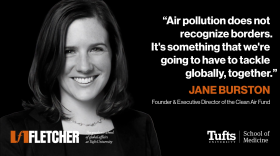-
A Potent Force The Liberty Tree Flag & The Spirit of American Protest
Join Revolutionary Spaces, Ford Hall Forum, and GBH Forum Network on March 14 as we unearth a treasure from our expansive collection, the iconic Liberty Tree Flag, and explore the great American tradition of protest. Commemorating the 250th Anniversary of the Boston Tea Party, which ignited from the Meeting of the Body of the People at Old South Meeting House, we will examine how this artifact relates to protest and the fight for freedom in its time, connecting it to our broader understanding of American history. Revolutionary Spaces’ Collections Manager Lori Erickson will showcase the Liberty Tree Flag and discuss the artifact, which was used to mark the Liberty Tree as a site of memory that symbolized the power of protest. Almost every subsequent protest in Revolutionary Boston genuflected in some way to the Liberty Tree. Later, the flag was brought out at anti-slavery meetings and feminist meetings as a reminder of the power of protest to make change. We’ll then be joined by esteemed professor and award-winning author Robert David “KC” Johnson to explore the history of American protest movements, from colonial to present day. The program will conclude with an audience Q&A. This essential virtual program will provide context for future programs at Revolutionary Spaces and other institutions throughout the anniversary year of the Boston Tea Party, as we grapple with the notion of protest in our midst. ### Resources Two-part blog post about the Liberty Tree Flag from the old Bostonian Society Website, written by intern Kathryn Griffith, who spent a full sunner conducting research on this object under Nat Scheidley’s direction [Part 1 ](https://bostonhistory.squarespace.com/kingstreet/2014/08/not-that-samuel-adams-chasing.html) [Part 2 ](https://bostonhistory.squarespace.com/kingstreet/2014/08/not-that-samuel-adams-chasing_20.html) [Background on the Liberty Tree itself, from the Smithsonian Magazine](https://www.smithsonianmag.com/history/story-behind-forgotten-symbol-american-revolution-liberty-tree-180959162/) [The Freedoms We Lost by Barbara Clark Smith](https://thenewpress.com/books/freedoms-we-lost)Partner:Revolutionary Spaces -
From Politics to Policy: What Can Stop Gun Violence in America
Gun violence has become as ubiquitous as it is polarizing in the United States. An almost daily drumbeat of mass shooting events have made some people numb, others fearful that it could happen to them, and produced a generation for whom active shooter drills in schools are routine. However, as horrific as these events are, they represent only a fraction of the annual mortality rate. Suicide represents the largest share of gun-related deaths per year, followed by homicide, accidents, and domestic violence. Despite this, it seems that the only thing we can agree about is that the overall toll is too high. What, if anything, can be done? Join us as we move beyond the political battle over 2nd Amendment rights vs. public safety and take a deep dive into policy: what works, what doesn’t, and what is feasible to do in this highly charged environment with David Hemenway, Ph.D., Professor of Health Policy and Director of the Harvard Injury Control Research Center, Greg Jackson, Executive Director of the Community Justice Action Fund and Kevin Drakulich, Associate Director and Associate Professor of Criminology and Criminal Justice at Northeastern University. This series is produced in partnership with Ford Hall Forum, Suffolk University Political Science and Legal Studies Department and The Washington Center.Partner:Ford Hall Forum -
FORGETTING & REMEMBERING: what can we do about it?
Why do we remember certain things and forget others? Well research shows us that committing things to memory is far more complex than we imagine but so too is retrieving that information. According to neurologist Andrew Budson and neuroscientist Elizabeth Kensinger, forgetting is a necessary part of the process and there’s nothing shameful about using memory aids. In their book “Why We Forget and How to Remember Better: the science behind memory” they outline the three different phases that must occur, in order for us to have access to past content. They suggest some useful tips for helping us improve our recall and also say that sleep is critical if we are to have long-term access to our stored information. Other factors like aerobic exercise, eating right, interacting socially and doing crossword puzzles are all good tools that will help keep brains healthy and maintain strong memories. If you want to learn more tricks about keeping your brain sharp and training your memory, join Cambridge Forum in the conversation with Budson and Kensinger. Don’t forget!Partner:Cambridge Forum -
Margaret A. Burnham with By Hands Now Known
A paradigm-shifting investigation of Jim Crow–era violence from a renowned legal scholar, this “meticulously researched and carefully documented” historical work presents ”dozens of fully fleshed out stories…examples, of course, of countless stories left untold.” (Booklist) Many may recognize the names of civil rights activists—from Rosa Parks to Medgar Evers to Martin Luther King Jr.—but they likely have little sense of the quotidian violence of Jim Crow, the system of white supremacy that prevailed between the late nineteenth and mid-twentieth century. Now, the gap has been filled by author Margaret Burnham, Northeastern University School of Law’s Civil Rights and Restorative Justice Project, and its archive of nearly one thousand cases of previously undocumented racial homicides between 1930 and 1955. Drawn from these archives and augmented by newspaper accounts, court testimony and rulings, coroner’s reports, and interviews with surviving witnesses, family, and clergy, _By Hands Now Known_ is essential reading. Those interested in race, history, and law will find it groundbreaking, illuminating, and moving. **Margaret A. Burnham** is the founding director of the Civil Rights and Restorative Justice Project at Northeastern University and has been a staffer for the Student Nonviolent Coordinating Committee, a civil rights lawyer, a defense attorney, and a judge. A professor of law, she was nominated by President Biden and confirmed by the US Senate to serve on the Civil Rights Cold Case Records Review Board. **Moderator L’Merchie Frazier** is a visual activist, public historian and artist, innovator, and poet. She is Executive Director of Creative / Strategic PLANNING for SPOKE Arts and former Director of Education and Interpretation for the Museum of African American History, Boston/Nantucket, and was recently named an Art Commissioner for Massachusetts. Presented by the American Inspiration Series from American Ancestors/NEHGS, in partnership with Boston Public Library, Museum of African American History, and GBH Forum NetworkPartner:American Ancestors -
The Greatest Athlete in American History : Jim Thorpe or Bo Jackson?
Join us for a spirited debate between two celebrated journalists and bestselling authors: Who is the greatest athlete in American history: Jim Thorpe or Bo Jackson? Both made history on the field, and off. Votes will be counted! Some say that Jim Thorpe (1887-1953) was America’s greatest all-around athlete: a gold medalist at the 1912 Olympics in the decathlon and pentathlon; a star on the Carlisle Indian School’s football team and the first class of the Pro Football Hall of Fame; and a major league baseball player for John McGraw’s New York Giants. Other say Bo Jackson (b. 1962) tops the chart of all-time greats: the first person to simultaneously star in two major professional sports—and the only one to be named an All-Star in both baseball and football. Bo Jackson was a Heisman Trophy winner and a pop culture phenomenon. Despite their vast skills, both struggled against racism, both accomplished great things and reached stardom the American way: on the field of competition. Hear from two acclaimed writers, also super fans, about these remarkable athletes. Then cast your vote! Presented by the American Inspiration Series from American Ancestors/NEHGS in partnership with Boston Public Library and GBH Forum NetworkPartner:American Ancestors -
Social Media and Mental Health
As the negative effects of social media increase, parents, educators, and health professionals are searching for solutions. Teens are especially susceptible to the problem. Dr. Jacqueline Sperling describes the addictive nature of social media and its impact on self-esteem and attention span. She offers some possible solutions.Partner:Science for the Public -
Great Decisions | China and the U.S.
For the past ten years, the United States and China have been locked in a competition for who has the greatest global influence. One major point of contention is the status of Taiwanese sovereignty, which has become even more relevant recently with the possibility that Russia’s invasion of Ukraine may prompt China to take similar action regarding Taiwan. How will the United States engage a China which is increasingly seeking to expand its sphere of influence? Join us for a timely discussion of this topic with David Lampton, Senior Research Fellow at the SAIS Foreign Policy Institute and Professor Emeritus at Johns Hopkins School of Advanced International Studies.Partner:WorldBoston -
The 64 Year Climate Change Cover-Up
Big oil knew about greenhouse gases and their impact on climate change more than half a century ago – but instead of sharing the information, they lied and undermined its veracity. As far back as 1959, renowned physicist Edward Teller warned Robert Dunlap and other oil executives, about the global impact that greenhouse gases would have on temperatures, melting ice caps, rising oceans and largescale environmental destruction. Even while Exxon’s own scientists were warning of the catastrophic effect that climate change would cause around the world, their executives were spending millions of dollars “trying to convince people the emergency wasn’t real”. Geoff Dembicki is an investigative climate change journalist based in Brooklyn. He is a frequent contributor to The Guardian and VICE and his work has been featured in NPR, the Washington Post and the Nation. His new book _The Petroleum Papers: Inside the Far-Right Conspiracy to Cover Up Climate Change_, was named one of the 2022's top 10 books by the Washington Post and was a finalist for the 2022 Hilary Weston Writers' Trust Prize for Nonfiction. Alyssa Johl, Vice President, Legal for the Center for Climate Integrity will discuss the various litigation battles which are currently underway. Several State Attorney Generals and countries, including the Philippines, have taken law cases against oil companies for the damage inflicted by global warming. What is the level of liability for the oil industry for the destruction to the planet and its animal and human populations? They will be joined by Dr. Delta Merner, lead scientist for the Science Hub for Climate Litigation at the Union of Concerned Scientists. She provides timely, scientific evidence to support legal cases that hold fossil fuel companies accountable for climate-related damages. Photo credit : Pexels.com - Tom Fisk ### Resources [Link to Geoff Dembicki's book](https://greystonebooks.com/products/the-petroleum-papers) [Exxonmobil projection while publicly disparaging climate science ](https://blog.ucsusa.org/shaina-sadai/exxonmobil-accurately-projected-rising-temperatures-while-publicly-disparaging-climate-science/) [3-part series that Frontline did on Big Oil. Part I - The Denial ](https://www.youtube.com/watch?v=QAAbcNl4Lb8&list=PLr2L6TB8fh8FaZx0IFKi_FdNlaBRKc-Bz&t=50s) [Another article on the cover-up](https://theconversation.com/big-oils-trade-group-allies-outspent-clean-energy-groups-by-a-whopping-27x-with-billions-in-ads-and-lobbying-to-keep-fossil-fuels-flowing-198286) [The “Science" paper which caused the latest furor ](https://www.science.org/doi/10.1126/science.abk0063) [What Edward Teller told oil executives in 1959 - on the 100th anniversary of the oil industry ](https://www.theguardian.com/environment/climate-consensus-97-per-cent/2018/jan/01/on-its-hundredth-birthday-in-1959-edward-teller-warned-the-oil-industry-about-global-warming) [Article about Climate Racketeering](https://www.theguardian.com/environment/2022/dec/20/big-oil-is-behind-conspiracy-to-deceive-public-first-climate-racketeering-lawsuit-says)Partner:Cambridge Forum -
Virus vs Host: An Enduring Battle
The virus-host struggle is one of the most fascinating in Nature. Virus-based illnesses –smallpox, measles, polio, flu, covid—have been a major force in human history. But modern science has developed effective protective vaccines that have saved millions of lives. Viruses will continue to be a threat, and that keeps experts busy. Dr. Connor explains how viruses invade selected organisms, how immune systems fight against the invaders, and how vaccines provide vital protection against virus diseases.Partner:Science for the Public -
Air Pollution: A Climate and Health Emergency, & How We Can Tackle It
The Fletcher School, in partnership with Tufts University School of Medecine, present Dr. Maurice S. Segal Lecture with featured guest, Jane Burston. Jane Burston is the founder and executive director of the Clean Air Fund. She was previously head of Climate and Energy Science in the UK Government. Her talk focuses on the impacts of air pollution on our collective health and its consequences for public policy. The event is hosted by Rachel Kyte, Dean of the Fletcher School.Partner:Fletcher School









